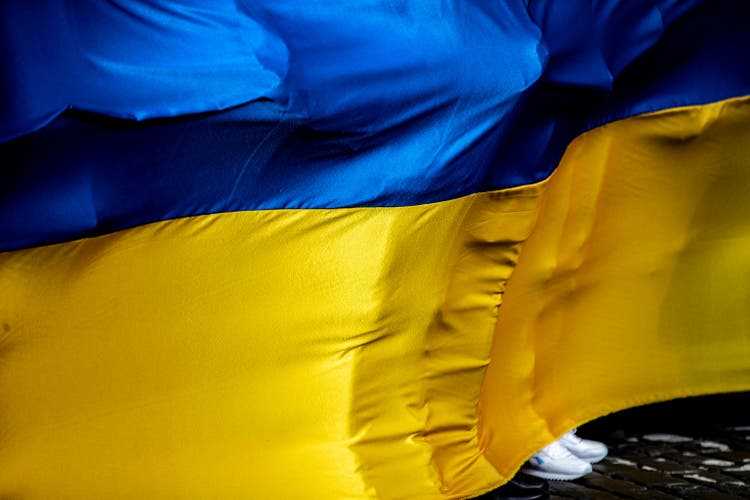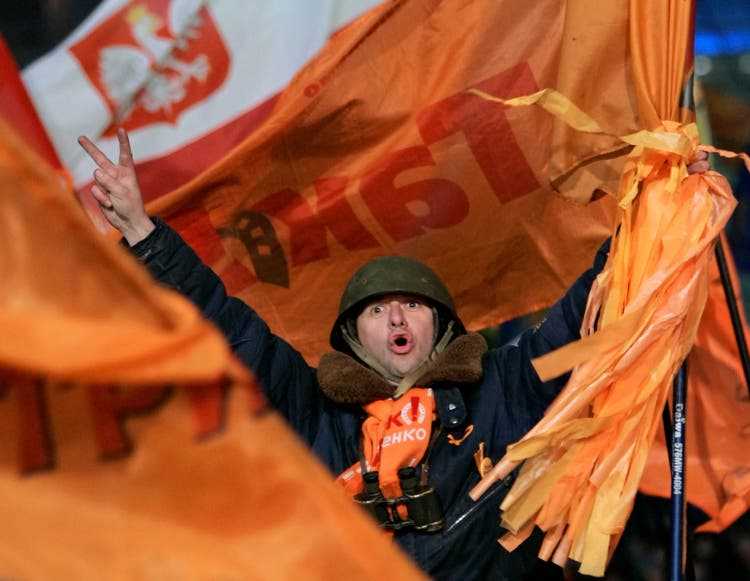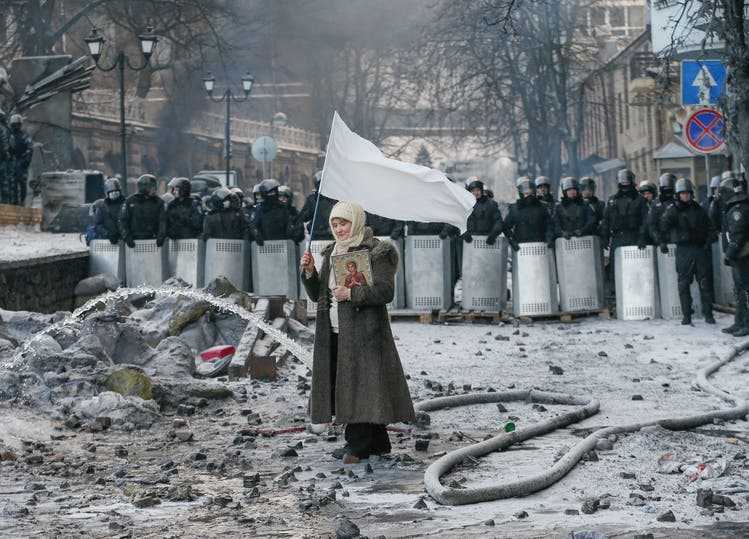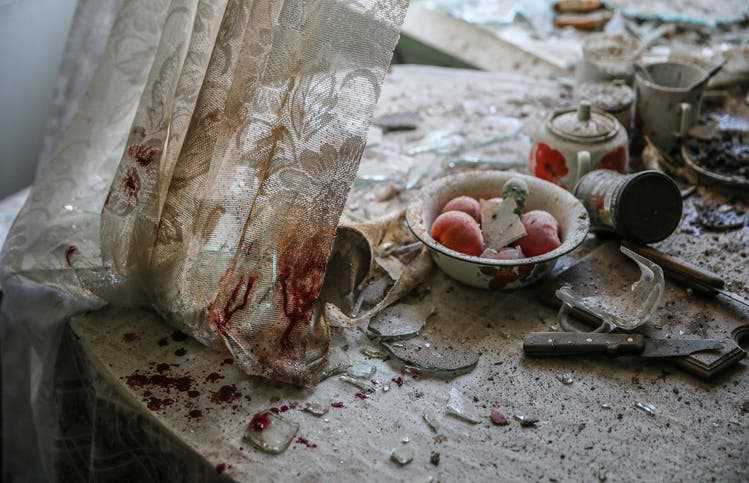Author Dmitri Gavrish, who was born in Kyiv and grew up in Bern, on a complicated relationship and the question of belonging.
A father says goodbye to his children who are leaving Kyiv for Lviv. March 3, 2022.
Like High German and Swiss German. That was my answer for years when new Swiss friends asked me how Russian and Ukrainian related to each other. Until I realized my mistake.
On May 23, 1993, at the age of eleven, the soles of my shoes touched Swiss soil for the first time. We were the “family reunification”: My father had started working in the new Ukrainian embassy in Bern months earlier, and now what was then Swissair also brought my mother, my little sister and me from Kyiv to Switzerland. I was amazed at the snow-capped peaks that we flew over. Even in economy class, all travelers were still able to enjoy a warm meal.
Even before passport control at Borispil International Airport near Kyiv, I had stopped crying. I didn’t cry for the country I was leaving, I cried for my grandparents who we were behind the barrier no way back, had left behind.
Otherwise it wasn’t difficult for me to say goodbye. I seemed to have already internalized that decay was part of life: of radioactive particles in Chernobyl reactor block number 4, of the Soviet army in Afghanistan, of the Soviet Union as a whole, of the value of the newly created independent Ukrainian money. Thanks to my parents who studied German, I knew: the German foreign language can be learned, and new friends will be made in Switzerland. I wasn’t afraid, on the contrary: “abroad” had always had positive connotations in my family; two generations of my family had spent the “time of their lives” there, in this Gogolian “wonderful distance”. So I was preparing to become the third generation of my family with a foreign background.

Demonstration against the war in Rome, February 27, 2022.
A fine crack
The first friends I made in Bern were Russians. Sure, we shared centuries of common history, we spoke a common language. Even if we no longer belonged to the same state entity. We were children, adolescents, soon-to-be teenagers, our parents worked for diplomatic missions, international organizations, chambers of commerce, so we were immensely privileged – whereas in those days in Kyiv you hardly dared go out on the street after dark, while in Moscow tanks were shooting at the parliament building .
And yet I felt a distance between us, a fine rift ran through our short-lived friendships, in our relationship, in our games, they brought with them a great lack of understanding from their parents’ house: which independent Ukraine? Russia, Ukraine and Belarus – we belong together. Over the years and decades that followed, I had to listen to variations of this phrase from Russians over and over again. When I think back and do a bit of math, such sentences were mostly said by those over 50 today. In other words, people whose thought patterns were still frozen in Soviet times, petrified into monuments of an earlier size.
The better my German skills got, the more often I had to convey Ukraine to my Swiss friends, I became something like their ambassador. Yes, the largest country in terms of area that is entirely in Europe. Back then, in the nineties, there were still around 50 million inhabitants (today 10 million fewer). Previously yes, now no longer part of Russia. Really not. Yes, really. Similar alcohol problem, but own language. Which perhaps sound like high-level language and dialect? But no, Ukrainian is not a dialect. But an independent language. The Ukraine also has a kind of Röstigraben, just call it the Dnipro, the river historically separates the more Russian-speaking east from the more Ukrainian-speaking west.
On my initiative, the school-leaving trip took my class to Kyiv, my very first literary publication, in my school’s magazine, bore the not unpathetic title “A Country of the Future.” The text was about Ukraine.

A supporter of Ukrainian opposition leader Viktor Yushchenko in Kyiv. His election as president was preceded by the so-called Orange Revolution – the movement against electoral fraud. December 27, 2004.
This corrupt, dependent country
At the same time I distanced myself from her. I regularly visited my parents in Kyiv, where they returned after their diplomatic days in Bern and where they are still, despite rocket attacks. But otherwise I stayed in Switzerland, stuck to Switzerland, wrote exclusively in German, forgot large parts of my first two languages (they only came back many years later, when I became a father myself and decided not to use Swiss German with the child to speak), when I landed in Zurich, cheekily queued me up for Swiss citizens, although the Swiss passport was still a “wonderful distance” at the time.
The truth is: During the times of the late-adolescent identity crisis, I was ashamed of my origins. I was ashamed of Ukraine’s corruption, which kept making headlines. It angered me that Ukraine did not follow the example of the former Baltic Soviet republics and seemed unwilling to become part of a united Europe. That she didn’t finally and decisively free herself from the grip of her “big brother” in the north-east. That she allowed herself to be exploited by oligarchs and their profit interests. That she had made little progress in the fight against anti-Semitism, racism, sexism and homophobia over the years.
But then came the fall of 2004. In Kyiv and other cities, Ukrainians took to the streets to demonstrate against massive election fraud in favor of the then pro-Russian presidential candidate. Surprised by the scale of the protests, the regime caved in and democracy prevailed.
I also wore an orange scarf back then, the color of the opposition that was victorious in the end. At that time, I too stood, albeit briefly, with my father on the Independence Maidan in Kyiv. Polling stations across the country closed at 8 p.m. on Sunday evening, December 26, and counting began. I can still well remember one of the speakers who made the assembled crowd, thousands upon thousands of people, collectively laugh: It looks good, Putin hasn’t yet congratulated the pro-Russian candidate on his victory. Previously, he had done it before even one polling station had been counted.

Ukrainian demonstrator during the anti-government protests on Maidan Square in Kyiv, retrospectively dubbed the “Revolution of Dignity”. 23 January 2014.

Damaged kitchen in Donetsk as a result of fighting between the Ukrainian army and separatists. 26 Aug 2014.
There are zero points from Switzerland
From today’s perspective, the largely peaceful Orange Revolution was Vladimir Putin’s first defeat in Ukraine. The second gave him the “Revolution of Dignity” on the Maidan ten years later. Everything that followed after that – the occupation of Crimea, the brutal trench warfare in Donbass as well as the current invasion of my native land – is his personal revenge for this humiliation, for repeatedly thwarting his neo-imperialist master plan for the local people, civil society to have?
Switzerland often strikes me as the opposite of Ukraine. As soon as I arrived in Bern, almost thirty years ago, I felt that a different wind was blowing here, not a «wind of change», there is no decay here, people are busy piling up eternities here, dealing with changes, with ups and downs outbreaks difficult. Does that explain why Switzerland was the only country to not give Ruslana Lischitschko a point for her “wild dances” at the 2004 Eurovision Song Contest? Even from Putin’s Russia, the eventual winner got full marks. At the same time, people from Switzerland, friends or acquaintances from all corners of the world, traveled to the Ukraine again and again, the country only had to remember itself, for example by intervening in the course of history.
In these anxious days, darkened by terrible news, I often think of a city trip that I made with my best friend from Bern: In 2005 we visited St. Petersburg and Moscow and then wanted to travel on to Kyiv. A few hours before the departure of our night train, we were stopped by the police in the middle of Moscow’s Red Square, under the eyes of the Kremlin. Not carrying a passport seemed illegal in Russia, we were told that we would now be taken to the police station, no big deal, we would be free again in three or four hours.
Since we didn’t feel like spending our last day in Russia in a police station, I asked if we couldn’t speed up the process, sort of settle the matter on the spot. The policeman and I shook hands, a large sum of money moving from my palm to his. The next morning the friend and I woke up in Ukraine, the Swiss native and the Ukrainian native both feeling oddly relieved.
A classmate of my son recently asked how similar Ukrainian and Russian actually are. Maybe like German and Dutch, I replied, related, maybe, and yet different.
Dmitry Gavrish, Born in 1982, is a Swiss writer and playwright of Ukrainian descent. He lives in Berlin.
